Analysis of Capital Allocation in International Financial Markets
VerifiedAdded on 2020/03/16
|23
|5420
|126
Report
AI Summary
This report provides an in-depth evaluation of financial markets and their role in allocating capital, both domestically (UK) and internationally (China). It examines capital allocation through investments, borrowing, financial instruments, and stock exchanges. The report analyzes the UK's financial sector, highlighting the importance of asset management and its impact on capital allocation, including the role of the London Stock Exchange, investment trends, borrowing practices, and the influence of the Bank of England. The study then shifts to China, discussing the challenges faced due to industrialization and trade policies. The report covers financial market mechanisms, including the over-the-counter and exchange-driven markets and various financial instruments. Overall, the report offers a comprehensive overview of capital allocation dynamics and challenges in these key economies.
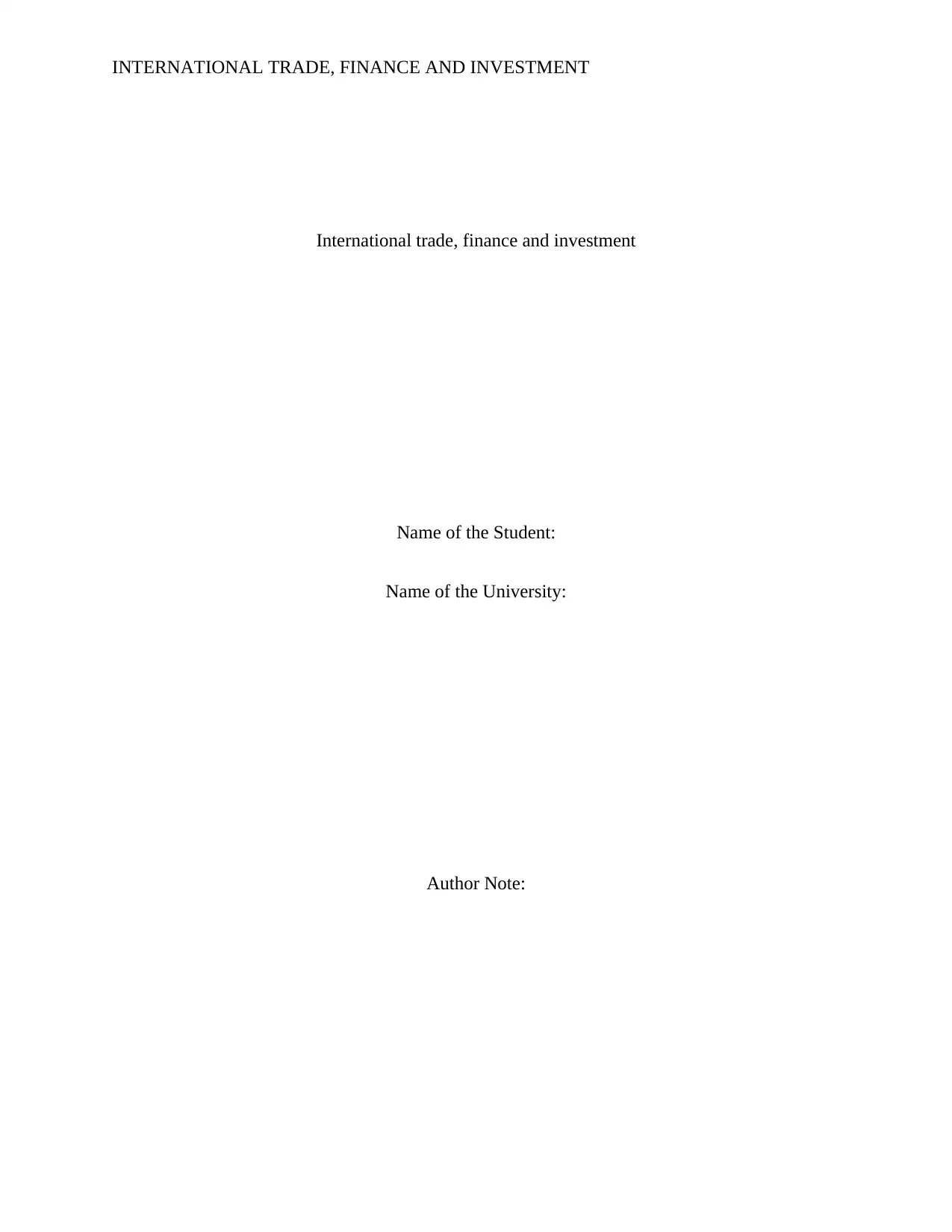
INTERNATIONAL TRADE, FINANCE AND INVESTMENT
International trade, finance and investment
Name of the Student:
Name of the University:
Author Note:
International trade, finance and investment
Name of the Student:
Name of the University:
Author Note:
Paraphrase This Document
Need a fresh take? Get an instant paraphrase of this document with our AI Paraphraser
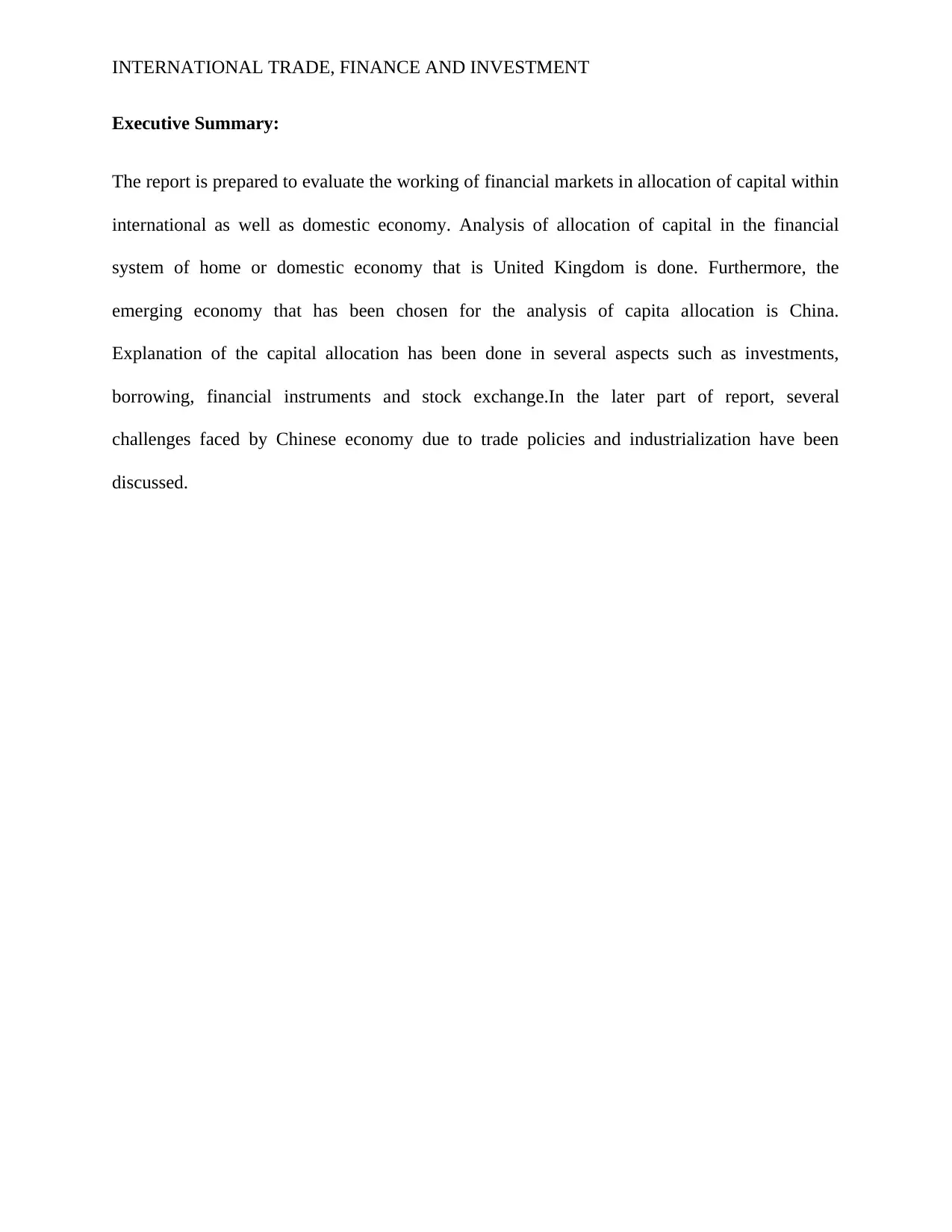
INTERNATIONAL TRADE, FINANCE AND INVESTMENT
Executive Summary:
The report is prepared to evaluate the working of financial markets in allocation of capital within
international as well as domestic economy. Analysis of allocation of capital in the financial
system of home or domestic economy that is United Kingdom is done. Furthermore, the
emerging economy that has been chosen for the analysis of capita allocation is China.
Explanation of the capital allocation has been done in several aspects such as investments,
borrowing, financial instruments and stock exchange.In the later part of report, several
challenges faced by Chinese economy due to trade policies and industrialization have been
discussed.
Executive Summary:
The report is prepared to evaluate the working of financial markets in allocation of capital within
international as well as domestic economy. Analysis of allocation of capital in the financial
system of home or domestic economy that is United Kingdom is done. Furthermore, the
emerging economy that has been chosen for the analysis of capita allocation is China.
Explanation of the capital allocation has been done in several aspects such as investments,
borrowing, financial instruments and stock exchange.In the later part of report, several
challenges faced by Chinese economy due to trade policies and industrialization have been
discussed.
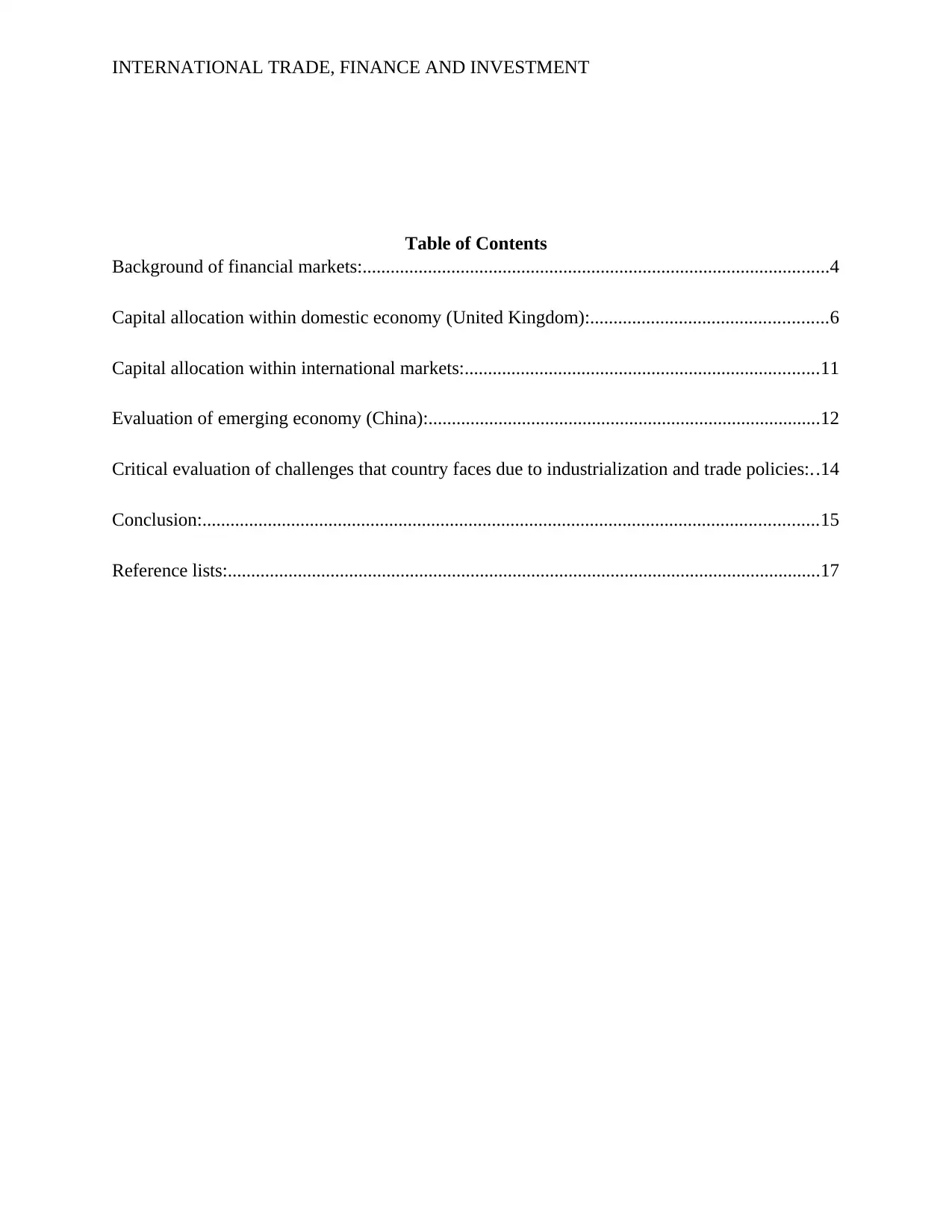
INTERNATIONAL TRADE, FINANCE AND INVESTMENT
Table of Contents
Background of financial markets:....................................................................................................4
Capital allocation within domestic economy (United Kingdom):...................................................6
Capital allocation within international markets:............................................................................11
Evaluation of emerging economy (China):....................................................................................12
Critical evaluation of challenges that country faces due to industrialization and trade policies:..14
Conclusion:....................................................................................................................................15
Reference lists:...............................................................................................................................17
Table of Contents
Background of financial markets:....................................................................................................4
Capital allocation within domestic economy (United Kingdom):...................................................6
Capital allocation within international markets:............................................................................11
Evaluation of emerging economy (China):....................................................................................12
Critical evaluation of challenges that country faces due to industrialization and trade policies:..14
Conclusion:....................................................................................................................................15
Reference lists:...............................................................................................................................17
⊘ This is a preview!⊘
Do you want full access?
Subscribe today to unlock all pages.

Trusted by 1+ million students worldwide
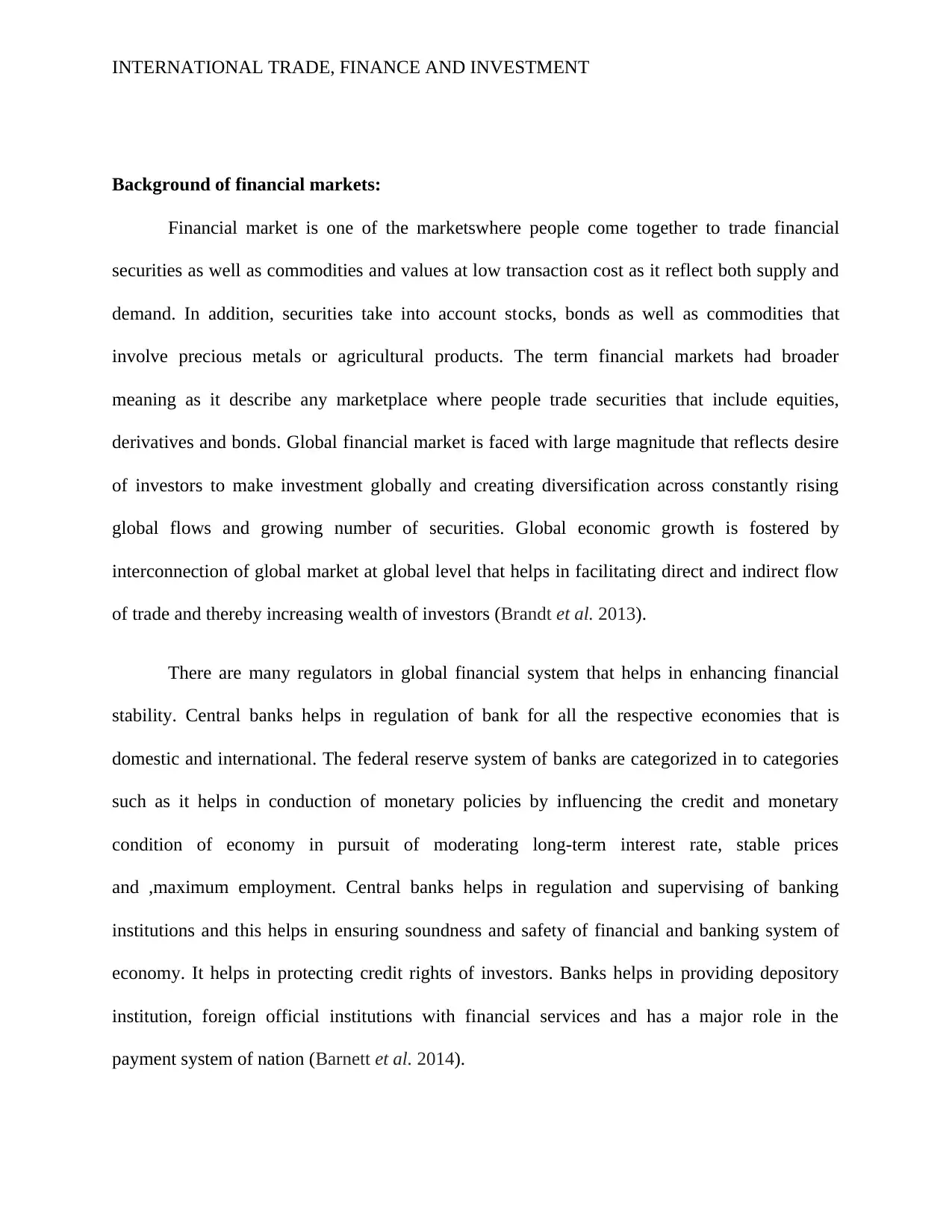
INTERNATIONAL TRADE, FINANCE AND INVESTMENT
Background of financial markets:
Financial market is one of the marketswhere people come together to trade financial
securities as well as commodities and values at low transaction cost as it reflect both supply and
demand. In addition, securities take into account stocks, bonds as well as commodities that
involve precious metals or agricultural products. The term financial markets had broader
meaning as it describe any marketplace where people trade securities that include equities,
derivatives and bonds. Global financial market is faced with large magnitude that reflects desire
of investors to make investment globally and creating diversification across constantly rising
global flows and growing number of securities. Global economic growth is fostered by
interconnection of global market at global level that helps in facilitating direct and indirect flow
of trade and thereby increasing wealth of investors (Brandt et al. 2013).
There are many regulators in global financial system that helps in enhancing financial
stability. Central banks helps in regulation of bank for all the respective economies that is
domestic and international. The federal reserve system of banks are categorized in to categories
such as it helps in conduction of monetary policies by influencing the credit and monetary
condition of economy in pursuit of moderating long-term interest rate, stable prices
and ,maximum employment. Central banks helps in regulation and supervising of banking
institutions and this helps in ensuring soundness and safety of financial and banking system of
economy. It helps in protecting credit rights of investors. Banks helps in providing depository
institution, foreign official institutions with financial services and has a major role in the
payment system of nation (Barnett et al. 2014).
Background of financial markets:
Financial market is one of the marketswhere people come together to trade financial
securities as well as commodities and values at low transaction cost as it reflect both supply and
demand. In addition, securities take into account stocks, bonds as well as commodities that
involve precious metals or agricultural products. The term financial markets had broader
meaning as it describe any marketplace where people trade securities that include equities,
derivatives and bonds. Global financial market is faced with large magnitude that reflects desire
of investors to make investment globally and creating diversification across constantly rising
global flows and growing number of securities. Global economic growth is fostered by
interconnection of global market at global level that helps in facilitating direct and indirect flow
of trade and thereby increasing wealth of investors (Brandt et al. 2013).
There are many regulators in global financial system that helps in enhancing financial
stability. Central banks helps in regulation of bank for all the respective economies that is
domestic and international. The federal reserve system of banks are categorized in to categories
such as it helps in conduction of monetary policies by influencing the credit and monetary
condition of economy in pursuit of moderating long-term interest rate, stable prices
and ,maximum employment. Central banks helps in regulation and supervising of banking
institutions and this helps in ensuring soundness and safety of financial and banking system of
economy. It helps in protecting credit rights of investors. Banks helps in providing depository
institution, foreign official institutions with financial services and has a major role in the
payment system of nation (Barnett et al. 2014).
Paraphrase This Document
Need a fresh take? Get an instant paraphrase of this document with our AI Paraphraser
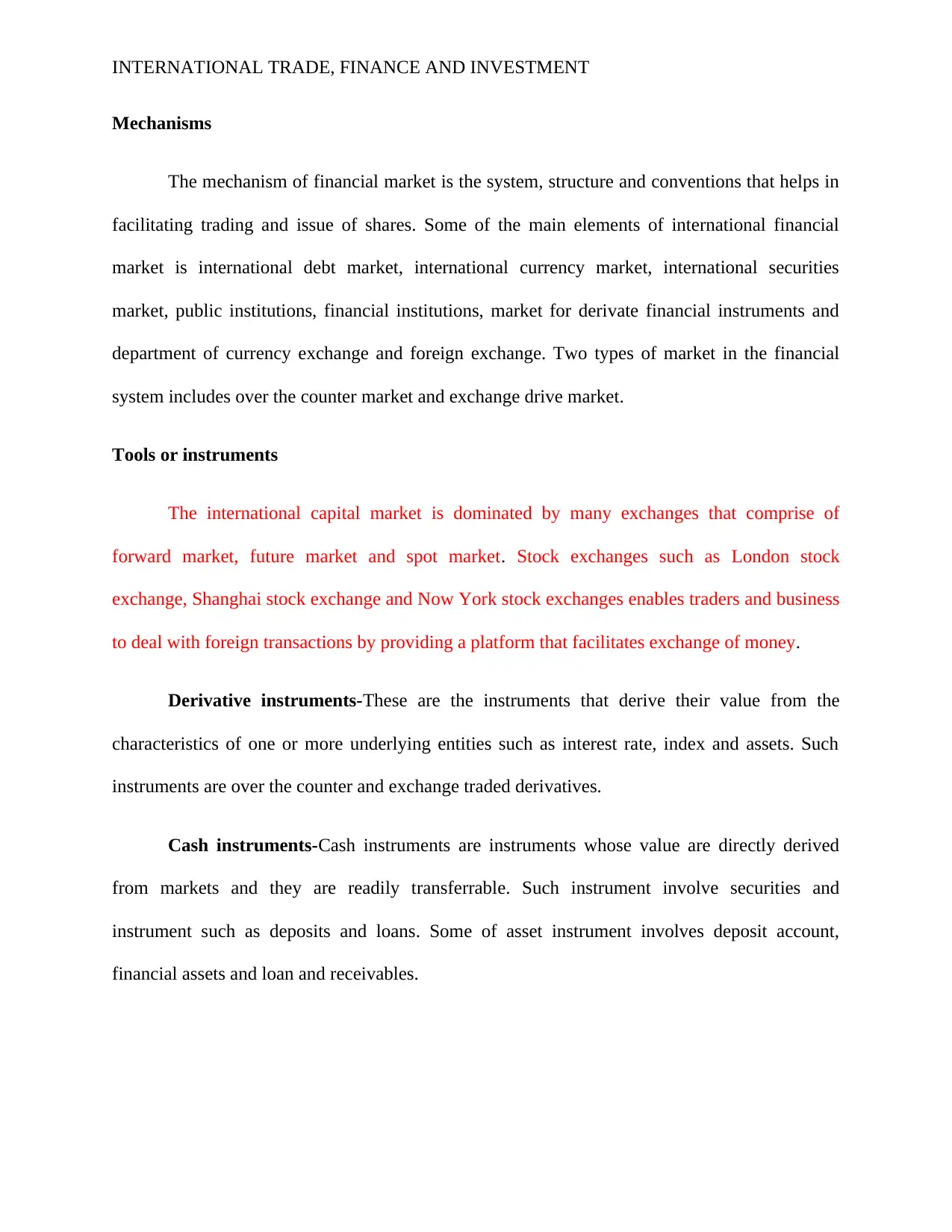
INTERNATIONAL TRADE, FINANCE AND INVESTMENT
Mechanisms
The mechanism of financial market is the system, structure and conventions that helps in
facilitating trading and issue of shares. Some of the main elements of international financial
market is international debt market, international currency market, international securities
market, public institutions, financial institutions, market for derivate financial instruments and
department of currency exchange and foreign exchange. Two types of market in the financial
system includes over the counter market and exchange drive market.
Tools or instruments
The international capital market is dominated by many exchanges that comprise of
forward market, future market and spot market. Stock exchanges such as London stock
exchange, Shanghai stock exchange and Now York stock exchanges enables traders and business
to deal with foreign transactions by providing a platform that facilitates exchange of money.
Derivative instruments-These are the instruments that derive their value from the
characteristics of one or more underlying entities such as interest rate, index and assets. Such
instruments are over the counter and exchange traded derivatives.
Cash instruments-Cash instruments are instruments whose value are directly derived
from markets and they are readily transferrable. Such instrument involve securities and
instrument such as deposits and loans. Some of asset instrument involves deposit account,
financial assets and loan and receivables.
Mechanisms
The mechanism of financial market is the system, structure and conventions that helps in
facilitating trading and issue of shares. Some of the main elements of international financial
market is international debt market, international currency market, international securities
market, public institutions, financial institutions, market for derivate financial instruments and
department of currency exchange and foreign exchange. Two types of market in the financial
system includes over the counter market and exchange drive market.
Tools or instruments
The international capital market is dominated by many exchanges that comprise of
forward market, future market and spot market. Stock exchanges such as London stock
exchange, Shanghai stock exchange and Now York stock exchanges enables traders and business
to deal with foreign transactions by providing a platform that facilitates exchange of money.
Derivative instruments-These are the instruments that derive their value from the
characteristics of one or more underlying entities such as interest rate, index and assets. Such
instruments are over the counter and exchange traded derivatives.
Cash instruments-Cash instruments are instruments whose value are directly derived
from markets and they are readily transferrable. Such instrument involve securities and
instrument such as deposits and loans. Some of asset instrument involves deposit account,
financial assets and loan and receivables.
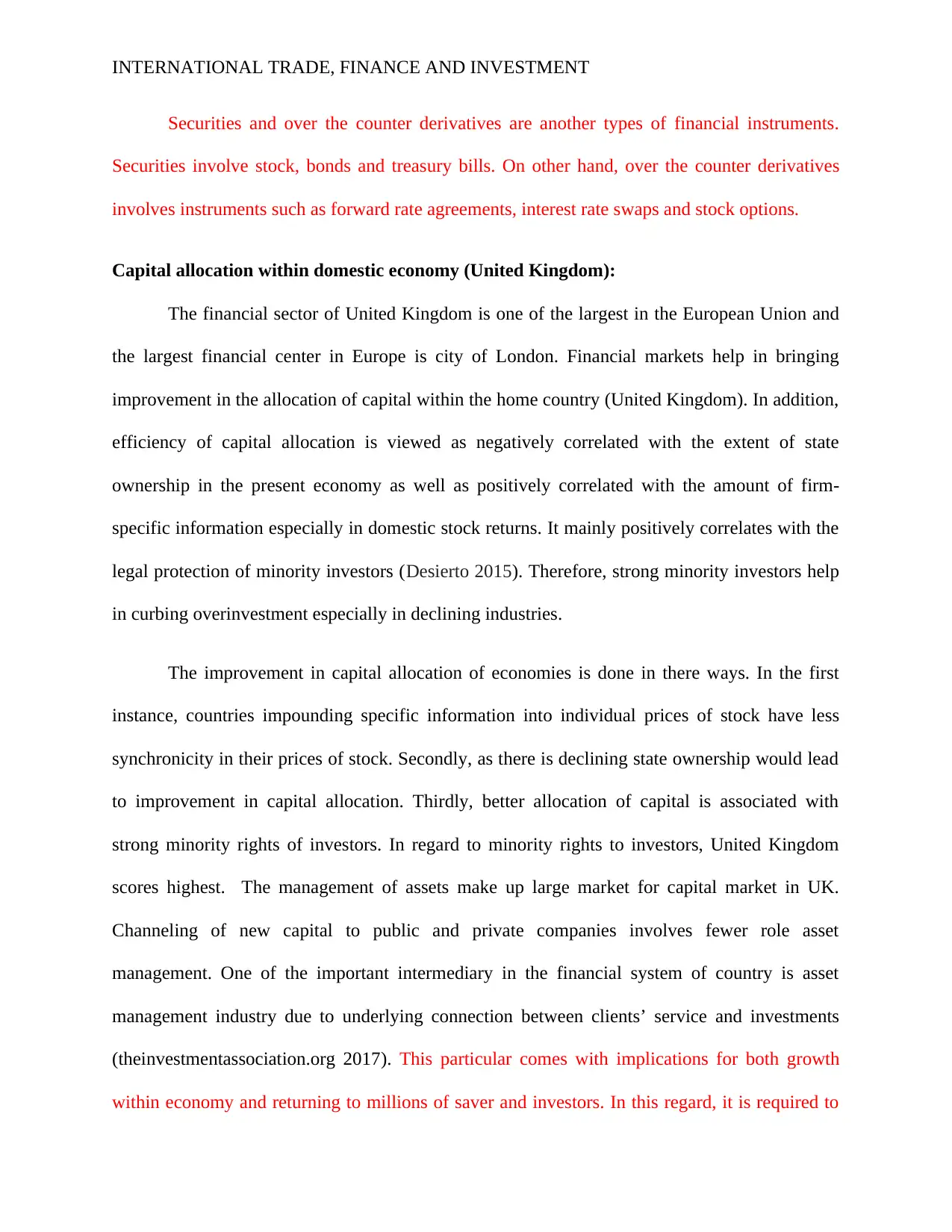
INTERNATIONAL TRADE, FINANCE AND INVESTMENT
Securities and over the counter derivatives are another types of financial instruments.
Securities involve stock, bonds and treasury bills. On other hand, over the counter derivatives
involves instruments such as forward rate agreements, interest rate swaps and stock options.
Capital allocation within domestic economy (United Kingdom):
The financial sector of United Kingdom is one of the largest in the European Union and
the largest financial center in Europe is city of London. Financial markets help in bringing
improvement in the allocation of capital within the home country (United Kingdom). In addition,
efficiency of capital allocation is viewed as negatively correlated with the extent of state
ownership in the present economy as well as positively correlated with the amount of firm-
specific information especially in domestic stock returns. It mainly positively correlates with the
legal protection of minority investors (Desierto 2015). Therefore, strong minority investors help
in curbing overinvestment especially in declining industries.
The improvement in capital allocation of economies is done in there ways. In the first
instance, countries impounding specific information into individual prices of stock have less
synchronicity in their prices of stock. Secondly, as there is declining state ownership would lead
to improvement in capital allocation. Thirdly, better allocation of capital is associated with
strong minority rights of investors. In regard to minority rights to investors, United Kingdom
scores highest. The management of assets make up large market for capital market in UK.
Channeling of new capital to public and private companies involves fewer role asset
management. One of the important intermediary in the financial system of country is asset
management industry due to underlying connection between clients’ service and investments
(theinvestmentassociation.org 2017). This particular comes with implications for both growth
within economy and returning to millions of saver and investors. In this regard, it is required to
Securities and over the counter derivatives are another types of financial instruments.
Securities involve stock, bonds and treasury bills. On other hand, over the counter derivatives
involves instruments such as forward rate agreements, interest rate swaps and stock options.
Capital allocation within domestic economy (United Kingdom):
The financial sector of United Kingdom is one of the largest in the European Union and
the largest financial center in Europe is city of London. Financial markets help in bringing
improvement in the allocation of capital within the home country (United Kingdom). In addition,
efficiency of capital allocation is viewed as negatively correlated with the extent of state
ownership in the present economy as well as positively correlated with the amount of firm-
specific information especially in domestic stock returns. It mainly positively correlates with the
legal protection of minority investors (Desierto 2015). Therefore, strong minority investors help
in curbing overinvestment especially in declining industries.
The improvement in capital allocation of economies is done in there ways. In the first
instance, countries impounding specific information into individual prices of stock have less
synchronicity in their prices of stock. Secondly, as there is declining state ownership would lead
to improvement in capital allocation. Thirdly, better allocation of capital is associated with
strong minority rights of investors. In regard to minority rights to investors, United Kingdom
scores highest. The management of assets make up large market for capital market in UK.
Channeling of new capital to public and private companies involves fewer role asset
management. One of the important intermediary in the financial system of country is asset
management industry due to underlying connection between clients’ service and investments
(theinvestmentassociation.org 2017). This particular comes with implications for both growth
within economy and returning to millions of saver and investors. In this regard, it is required to
⊘ This is a preview!⊘
Do you want full access?
Subscribe today to unlock all pages.

Trusted by 1+ million students worldwide
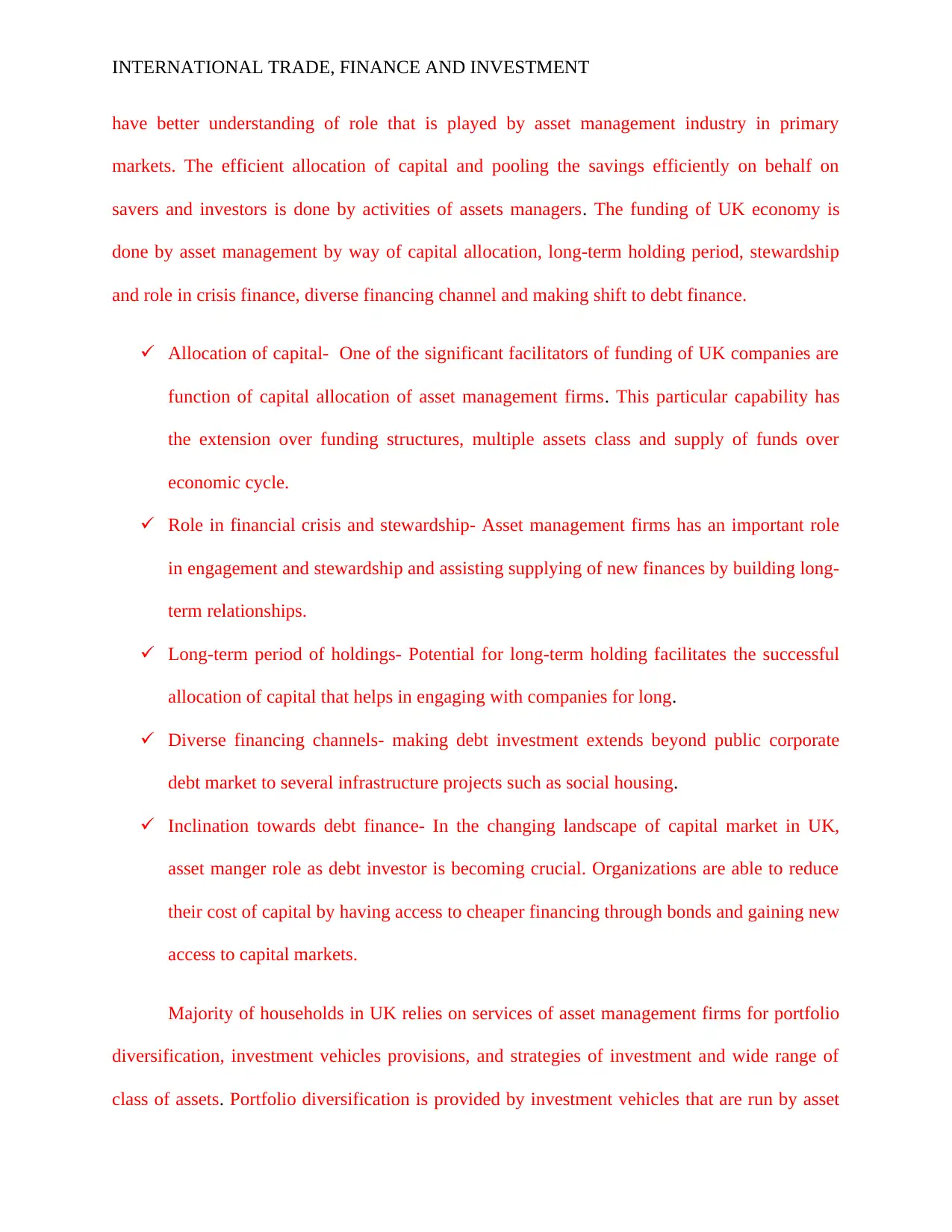
INTERNATIONAL TRADE, FINANCE AND INVESTMENT
have better understanding of role that is played by asset management industry in primary
markets. The efficient allocation of capital and pooling the savings efficiently on behalf on
savers and investors is done by activities of assets managers. The funding of UK economy is
done by asset management by way of capital allocation, long-term holding period, stewardship
and role in crisis finance, diverse financing channel and making shift to debt finance.
Allocation of capital- One of the significant facilitators of funding of UK companies are
function of capital allocation of asset management firms. This particular capability has
the extension over funding structures, multiple assets class and supply of funds over
economic cycle.
Role in financial crisis and stewardship- Asset management firms has an important role
in engagement and stewardship and assisting supplying of new finances by building long-
term relationships.
Long-term period of holdings- Potential for long-term holding facilitates the successful
allocation of capital that helps in engaging with companies for long.
Diverse financing channels- making debt investment extends beyond public corporate
debt market to several infrastructure projects such as social housing.
Inclination towards debt finance- In the changing landscape of capital market in UK,
asset manger role as debt investor is becoming crucial. Organizations are able to reduce
their cost of capital by having access to cheaper financing through bonds and gaining new
access to capital markets.
Majority of households in UK relies on services of asset management firms for portfolio
diversification, investment vehicles provisions, and strategies of investment and wide range of
class of assets. Portfolio diversification is provided by investment vehicles that are run by asset
have better understanding of role that is played by asset management industry in primary
markets. The efficient allocation of capital and pooling the savings efficiently on behalf on
savers and investors is done by activities of assets managers. The funding of UK economy is
done by asset management by way of capital allocation, long-term holding period, stewardship
and role in crisis finance, diverse financing channel and making shift to debt finance.
Allocation of capital- One of the significant facilitators of funding of UK companies are
function of capital allocation of asset management firms. This particular capability has
the extension over funding structures, multiple assets class and supply of funds over
economic cycle.
Role in financial crisis and stewardship- Asset management firms has an important role
in engagement and stewardship and assisting supplying of new finances by building long-
term relationships.
Long-term period of holdings- Potential for long-term holding facilitates the successful
allocation of capital that helps in engaging with companies for long.
Diverse financing channels- making debt investment extends beyond public corporate
debt market to several infrastructure projects such as social housing.
Inclination towards debt finance- In the changing landscape of capital market in UK,
asset manger role as debt investor is becoming crucial. Organizations are able to reduce
their cost of capital by having access to cheaper financing through bonds and gaining new
access to capital markets.
Majority of households in UK relies on services of asset management firms for portfolio
diversification, investment vehicles provisions, and strategies of investment and wide range of
class of assets. Portfolio diversification is provided by investment vehicles that are run by asset
Paraphrase This Document
Need a fresh take? Get an instant paraphrase of this document with our AI Paraphraser
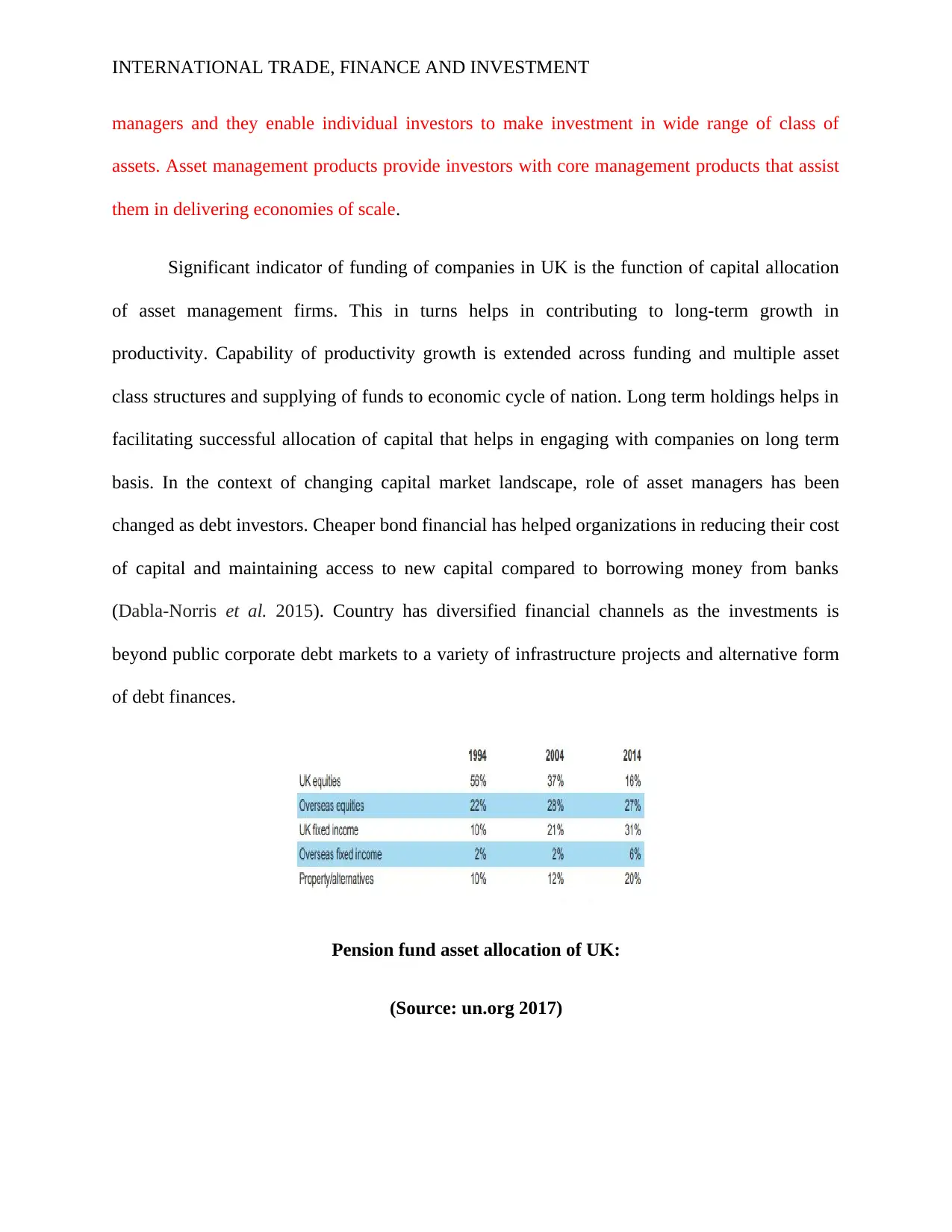
INTERNATIONAL TRADE, FINANCE AND INVESTMENT
managers and they enable individual investors to make investment in wide range of class of
assets. Asset management products provide investors with core management products that assist
them in delivering economies of scale.
Significant indicator of funding of companies in UK is the function of capital allocation
of asset management firms. This in turns helps in contributing to long-term growth in
productivity. Capability of productivity growth is extended across funding and multiple asset
class structures and supplying of funds to economic cycle of nation. Long term holdings helps in
facilitating successful allocation of capital that helps in engaging with companies on long term
basis. In the context of changing capital market landscape, role of asset managers has been
changed as debt investors. Cheaper bond financial has helped organizations in reducing their cost
of capital and maintaining access to new capital compared to borrowing money from banks
(Dabla-Norris et al. 2015). Country has diversified financial channels as the investments is
beyond public corporate debt markets to a variety of infrastructure projects and alternative form
of debt finances.
Pension fund asset allocation of UK:
(Source: un.org 2017)
managers and they enable individual investors to make investment in wide range of class of
assets. Asset management products provide investors with core management products that assist
them in delivering economies of scale.
Significant indicator of funding of companies in UK is the function of capital allocation
of asset management firms. This in turns helps in contributing to long-term growth in
productivity. Capability of productivity growth is extended across funding and multiple asset
class structures and supplying of funds to economic cycle of nation. Long term holdings helps in
facilitating successful allocation of capital that helps in engaging with companies on long term
basis. In the context of changing capital market landscape, role of asset managers has been
changed as debt investors. Cheaper bond financial has helped organizations in reducing their cost
of capital and maintaining access to new capital compared to borrowing money from banks
(Dabla-Norris et al. 2015). Country has diversified financial channels as the investments is
beyond public corporate debt markets to a variety of infrastructure projects and alternative form
of debt finances.
Pension fund asset allocation of UK:
(Source: un.org 2017)
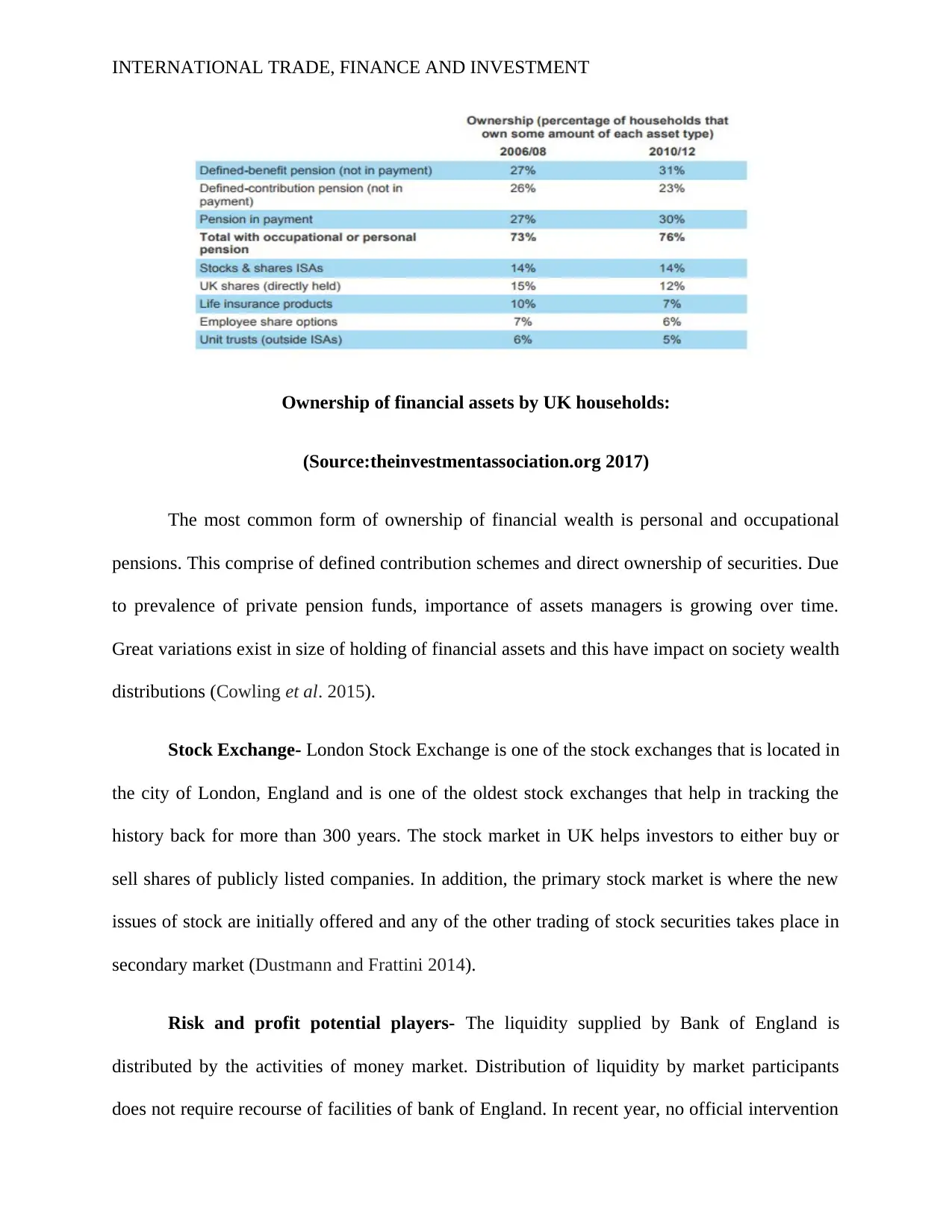
INTERNATIONAL TRADE, FINANCE AND INVESTMENT
Ownership of financial assets by UK households:
(Source:theinvestmentassociation.org 2017)
The most common form of ownership of financial wealth is personal and occupational
pensions. This comprise of defined contribution schemes and direct ownership of securities. Due
to prevalence of private pension funds, importance of assets managers is growing over time.
Great variations exist in size of holding of financial assets and this have impact on society wealth
distributions (Cowling et al. 2015).
Stock Exchange- London Stock Exchange is one of the stock exchanges that is located in
the city of London, England and is one of the oldest stock exchanges that help in tracking the
history back for more than 300 years. The stock market in UK helps investors to either buy or
sell shares of publicly listed companies. In addition, the primary stock market is where the new
issues of stock are initially offered and any of the other trading of stock securities takes place in
secondary market (Dustmann and Frattini 2014).
Risk and profit potential players- The liquidity supplied by Bank of England is
distributed by the activities of money market. Distribution of liquidity by market participants
does not require recourse of facilities of bank of England. In recent year, no official intervention
Ownership of financial assets by UK households:
(Source:theinvestmentassociation.org 2017)
The most common form of ownership of financial wealth is personal and occupational
pensions. This comprise of defined contribution schemes and direct ownership of securities. Due
to prevalence of private pension funds, importance of assets managers is growing over time.
Great variations exist in size of holding of financial assets and this have impact on society wealth
distributions (Cowling et al. 2015).
Stock Exchange- London Stock Exchange is one of the stock exchanges that is located in
the city of London, England and is one of the oldest stock exchanges that help in tracking the
history back for more than 300 years. The stock market in UK helps investors to either buy or
sell shares of publicly listed companies. In addition, the primary stock market is where the new
issues of stock are initially offered and any of the other trading of stock securities takes place in
secondary market (Dustmann and Frattini 2014).
Risk and profit potential players- The liquidity supplied by Bank of England is
distributed by the activities of money market. Distribution of liquidity by market participants
does not require recourse of facilities of bank of England. In recent year, no official intervention
⊘ This is a preview!⊘
Do you want full access?
Subscribe today to unlock all pages.

Trusted by 1+ million students worldwide
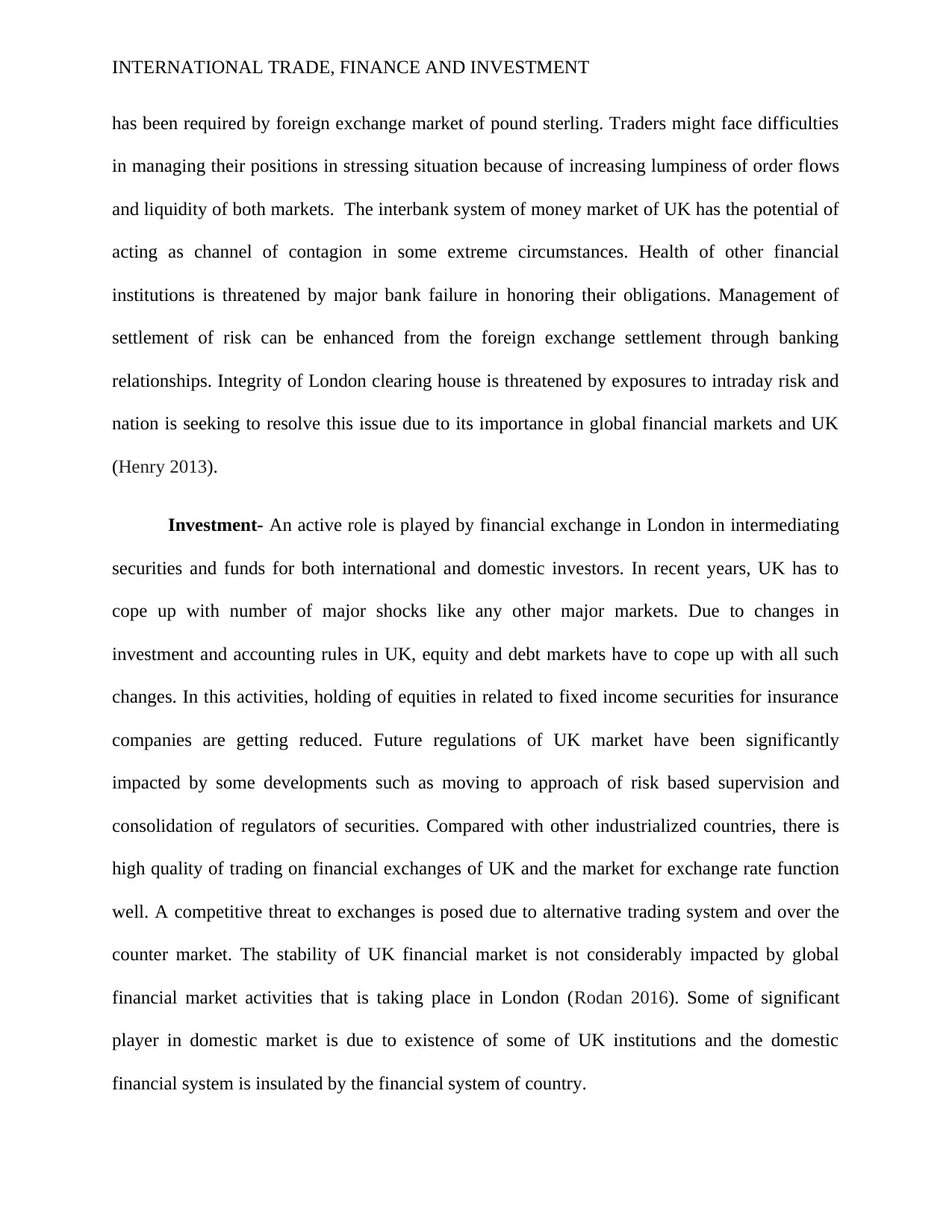
INTERNATIONAL TRADE, FINANCE AND INVESTMENT
has been required by foreign exchange market of pound sterling. Traders might face difficulties
in managing their positions in stressing situation because of increasing lumpiness of order flows
and liquidity of both markets. The interbank system of money market of UK has the potential of
acting as channel of contagion in some extreme circumstances. Health of other financial
institutions is threatened by major bank failure in honoring their obligations. Management of
settlement of risk can be enhanced from the foreign exchange settlement through banking
relationships. Integrity of London clearing house is threatened by exposures to intraday risk and
nation is seeking to resolve this issue due to its importance in global financial markets and UK
(Henry 2013).
Investment- An active role is played by financial exchange in London in intermediating
securities and funds for both international and domestic investors. In recent years, UK has to
cope up with number of major shocks like any other major markets. Due to changes in
investment and accounting rules in UK, equity and debt markets have to cope up with all such
changes. In this activities, holding of equities in related to fixed income securities for insurance
companies are getting reduced. Future regulations of UK market have been significantly
impacted by some developments such as moving to approach of risk based supervision and
consolidation of regulators of securities. Compared with other industrialized countries, there is
high quality of trading on financial exchanges of UK and the market for exchange rate function
well. A competitive threat to exchanges is posed due to alternative trading system and over the
counter market. The stability of UK financial market is not considerably impacted by global
financial market activities that is taking place in London (Rodan 2016). Some of significant
player in domestic market is due to existence of some of UK institutions and the domestic
financial system is insulated by the financial system of country.
has been required by foreign exchange market of pound sterling. Traders might face difficulties
in managing their positions in stressing situation because of increasing lumpiness of order flows
and liquidity of both markets. The interbank system of money market of UK has the potential of
acting as channel of contagion in some extreme circumstances. Health of other financial
institutions is threatened by major bank failure in honoring their obligations. Management of
settlement of risk can be enhanced from the foreign exchange settlement through banking
relationships. Integrity of London clearing house is threatened by exposures to intraday risk and
nation is seeking to resolve this issue due to its importance in global financial markets and UK
(Henry 2013).
Investment- An active role is played by financial exchange in London in intermediating
securities and funds for both international and domestic investors. In recent years, UK has to
cope up with number of major shocks like any other major markets. Due to changes in
investment and accounting rules in UK, equity and debt markets have to cope up with all such
changes. In this activities, holding of equities in related to fixed income securities for insurance
companies are getting reduced. Future regulations of UK market have been significantly
impacted by some developments such as moving to approach of risk based supervision and
consolidation of regulators of securities. Compared with other industrialized countries, there is
high quality of trading on financial exchanges of UK and the market for exchange rate function
well. A competitive threat to exchanges is posed due to alternative trading system and over the
counter market. The stability of UK financial market is not considerably impacted by global
financial market activities that is taking place in London (Rodan 2016). Some of significant
player in domestic market is due to existence of some of UK institutions and the domestic
financial system is insulated by the financial system of country.
Paraphrase This Document
Need a fresh take? Get an instant paraphrase of this document with our AI Paraphraser
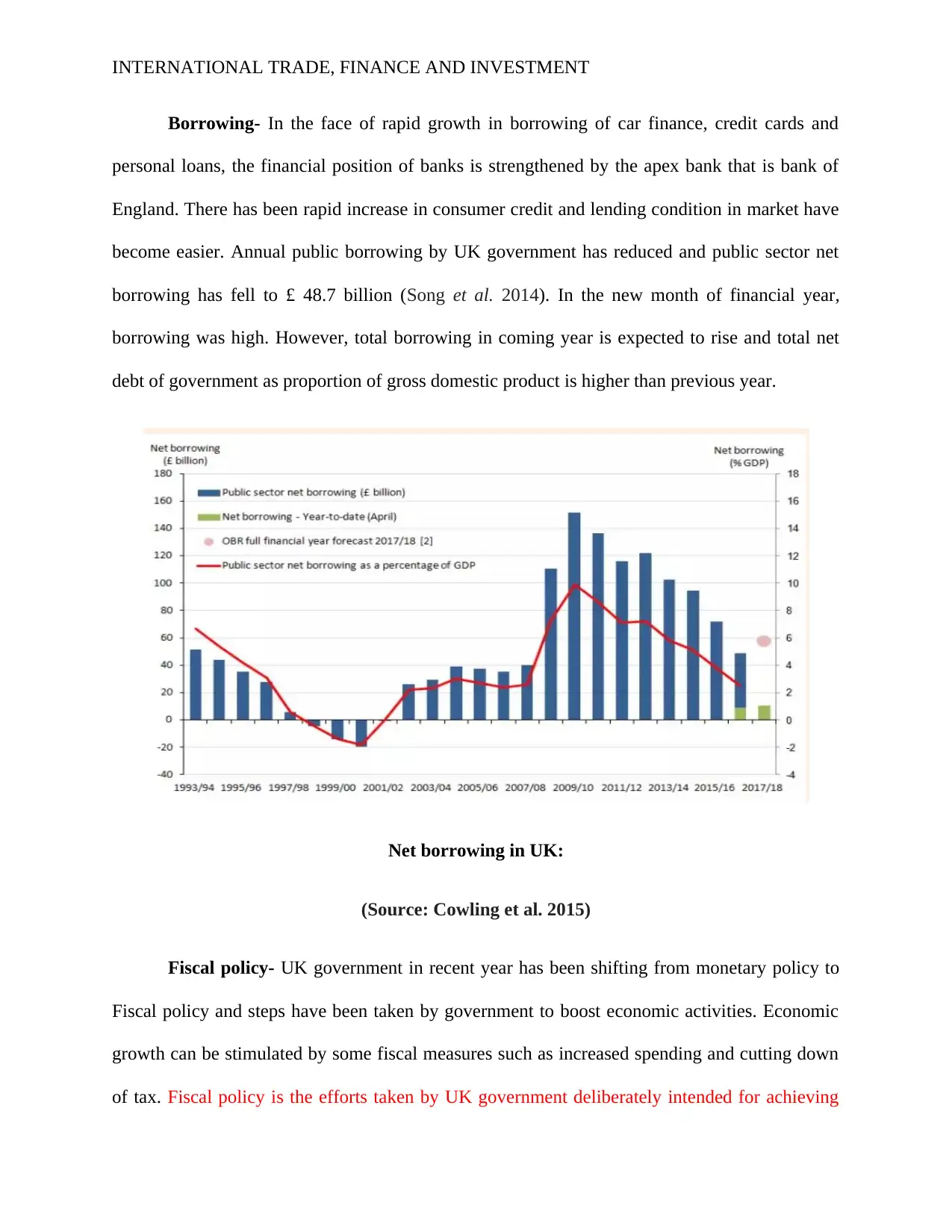
INTERNATIONAL TRADE, FINANCE AND INVESTMENT
Borrowing- In the face of rapid growth in borrowing of car finance, credit cards and
personal loans, the financial position of banks is strengthened by the apex bank that is bank of
England. There has been rapid increase in consumer credit and lending condition in market have
become easier. Annual public borrowing by UK government has reduced and public sector net
borrowing has fell to £ 48.7 billion (Song et al. 2014). In the new month of financial year,
borrowing was high. However, total borrowing in coming year is expected to rise and total net
debt of government as proportion of gross domestic product is higher than previous year.
Net borrowing in UK:
(Source: Cowling et al. 2015)
Fiscal policy- UK government in recent year has been shifting from monetary policy to
Fiscal policy and steps have been taken by government to boost economic activities. Economic
growth can be stimulated by some fiscal measures such as increased spending and cutting down
of tax. Fiscal policy is the efforts taken by UK government deliberately intended for achieving
Borrowing- In the face of rapid growth in borrowing of car finance, credit cards and
personal loans, the financial position of banks is strengthened by the apex bank that is bank of
England. There has been rapid increase in consumer credit and lending condition in market have
become easier. Annual public borrowing by UK government has reduced and public sector net
borrowing has fell to £ 48.7 billion (Song et al. 2014). In the new month of financial year,
borrowing was high. However, total borrowing in coming year is expected to rise and total net
debt of government as proportion of gross domestic product is higher than previous year.
Net borrowing in UK:
(Source: Cowling et al. 2015)
Fiscal policy- UK government in recent year has been shifting from monetary policy to
Fiscal policy and steps have been taken by government to boost economic activities. Economic
growth can be stimulated by some fiscal measures such as increased spending and cutting down
of tax. Fiscal policy is the efforts taken by UK government deliberately intended for achieving
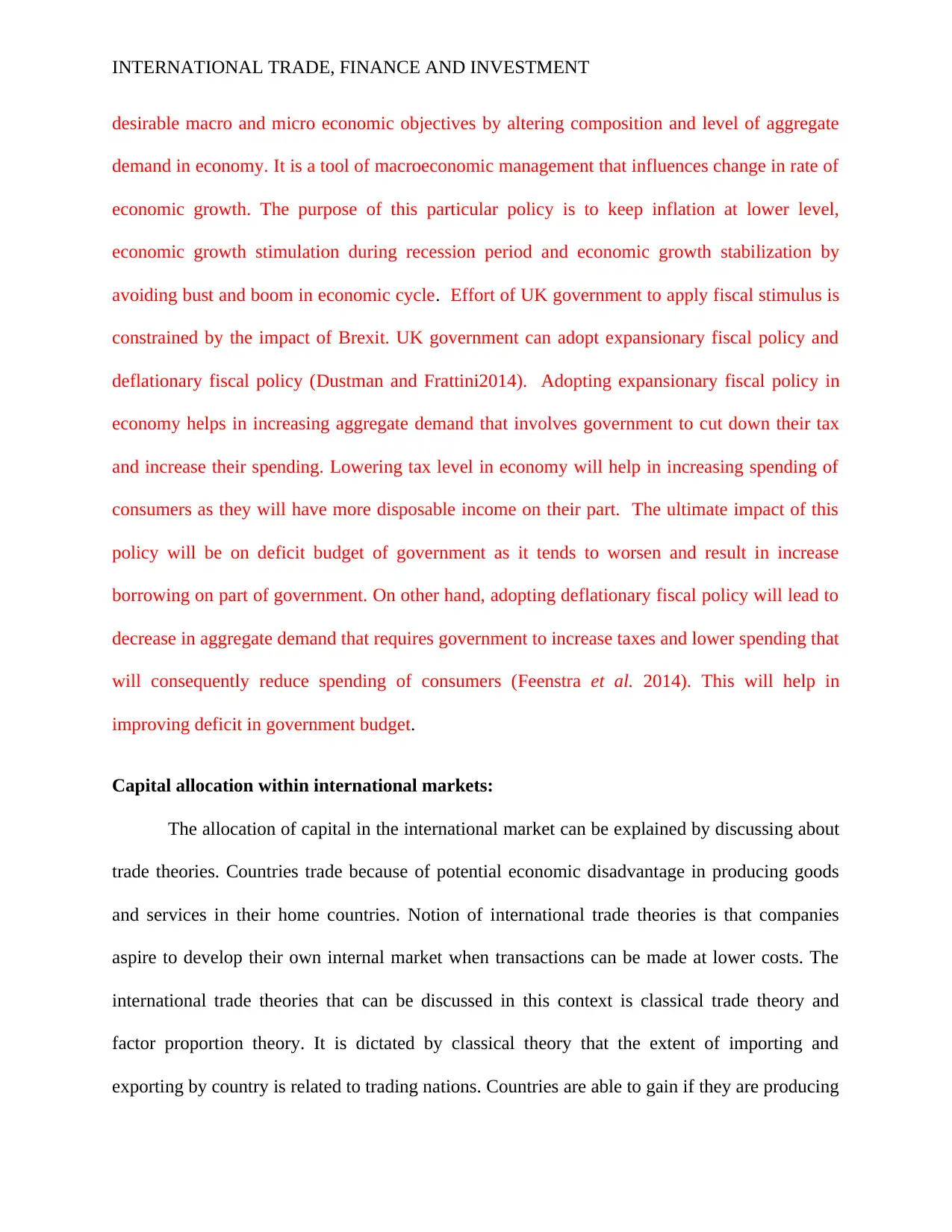
INTERNATIONAL TRADE, FINANCE AND INVESTMENT
desirable macro and micro economic objectives by altering composition and level of aggregate
demand in economy. It is a tool of macroeconomic management that influences change in rate of
economic growth. The purpose of this particular policy is to keep inflation at lower level,
economic growth stimulation during recession period and economic growth stabilization by
avoiding bust and boom in economic cycle. Effort of UK government to apply fiscal stimulus is
constrained by the impact of Brexit. UK government can adopt expansionary fiscal policy and
deflationary fiscal policy (Dustman and Frattini2014). Adopting expansionary fiscal policy in
economy helps in increasing aggregate demand that involves government to cut down their tax
and increase their spending. Lowering tax level in economy will help in increasing spending of
consumers as they will have more disposable income on their part. The ultimate impact of this
policy will be on deficit budget of government as it tends to worsen and result in increase
borrowing on part of government. On other hand, adopting deflationary fiscal policy will lead to
decrease in aggregate demand that requires government to increase taxes and lower spending that
will consequently reduce spending of consumers (Feenstra et al. 2014). This will help in
improving deficit in government budget.
Capital allocation within international markets:
The allocation of capital in the international market can be explained by discussing about
trade theories. Countries trade because of potential economic disadvantage in producing goods
and services in their home countries. Notion of international trade theories is that companies
aspire to develop their own internal market when transactions can be made at lower costs. The
international trade theories that can be discussed in this context is classical trade theory and
factor proportion theory. It is dictated by classical theory that the extent of importing and
exporting by country is related to trading nations. Countries are able to gain if they are producing
desirable macro and micro economic objectives by altering composition and level of aggregate
demand in economy. It is a tool of macroeconomic management that influences change in rate of
economic growth. The purpose of this particular policy is to keep inflation at lower level,
economic growth stimulation during recession period and economic growth stabilization by
avoiding bust and boom in economic cycle. Effort of UK government to apply fiscal stimulus is
constrained by the impact of Brexit. UK government can adopt expansionary fiscal policy and
deflationary fiscal policy (Dustman and Frattini2014). Adopting expansionary fiscal policy in
economy helps in increasing aggregate demand that involves government to cut down their tax
and increase their spending. Lowering tax level in economy will help in increasing spending of
consumers as they will have more disposable income on their part. The ultimate impact of this
policy will be on deficit budget of government as it tends to worsen and result in increase
borrowing on part of government. On other hand, adopting deflationary fiscal policy will lead to
decrease in aggregate demand that requires government to increase taxes and lower spending that
will consequently reduce spending of consumers (Feenstra et al. 2014). This will help in
improving deficit in government budget.
Capital allocation within international markets:
The allocation of capital in the international market can be explained by discussing about
trade theories. Countries trade because of potential economic disadvantage in producing goods
and services in their home countries. Notion of international trade theories is that companies
aspire to develop their own internal market when transactions can be made at lower costs. The
international trade theories that can be discussed in this context is classical trade theory and
factor proportion theory. It is dictated by classical theory that the extent of importing and
exporting by country is related to trading nations. Countries are able to gain if they are producing
⊘ This is a preview!⊘
Do you want full access?
Subscribe today to unlock all pages.

Trusted by 1+ million students worldwide
1 out of 23
Related Documents
Your All-in-One AI-Powered Toolkit for Academic Success.
+13062052269
info@desklib.com
Available 24*7 on WhatsApp / Email
![[object Object]](/_next/static/media/star-bottom.7253800d.svg)
Unlock your academic potential
Copyright © 2020–2026 A2Z Services. All Rights Reserved. Developed and managed by ZUCOL.




